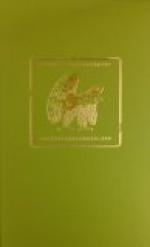“Yes. While he was desperately ill in that hospital. I—I don’t know what he will think of me—when he hears—” she went on with little, steadying pauses. “It is difficult to explain. So much happened on that drive to the Wenatchee valley. In the end, during an electrical storm, he saved me from a falling tree. What he asked of me was so very little, the weight of a feather, against all I owe him. Still, a woman does not allow even such a man to finance her affairs; people never would have understood. Besides, how could I have hoped, in a lifetime, to pay the loan? It was the most barren, desolate place; a deep, dry gulf shut in by a wicked mountain—you can’t imagine—and I told him I never could live there, make it my home.” They were nearly through the pergola; involuntarily she stopped and, looking up at Foster, the light from a Japanese lantern illumined her small, troubled face. “But in spite of everything,” she went on, “he believes differently. To-day his first message came from Washington to remind me he had not forgotten the project. How can I—when he is so ill— how can I let him know?”
Foster had had his hour; and, at this final moment, he sounded those hitherto unplumbed depths. “It will be all right,” he said steadily; “wait until you see what Lucky Banks does. You can trust him not to stand in Tisdale’s way. And don’t think I underrate Hollis Tisdale. He is a man in a thousand. No one knows that better than I. And that’s why I am going to hold him to his record.”
CHAPTER XXII
“AS MAN TO MAN”
In January, when Mrs. Feversham returned to Washington, her brother accompanied her as far as Wenatchee. He went prepared to offer Banks as high as five thousand dollars for his option.
At that time the Weatherbee tract was blanketed in snow. It never drifted, because Cerberus shut out the prevailing wind like a mighty door; even the bench and the high ridge beyond lifted above the levels of the vale smooth as upper floors. Previous to that rare precipitation, gangs of men, put to work on both quarter sections, had removed the sage-brush and planted trees, and the new orchard traced a delicate pattern on the white carpet in rows and squares. Banks had hurried the concrete lining of the basin walls, and when it became necessary to suspend construction on the flumes, he saw with satisfaction that the reservoir would husband the melting snows and so supply temporary irrigation in the early spring. All the lumber estimates had been included in his orders for building material in the autumn, and already the house on the bench showed a tiled roof above its mission walls, while down the gap and midway up the side slope of Cerberus rose the shingled gables of Annabel’s home.




